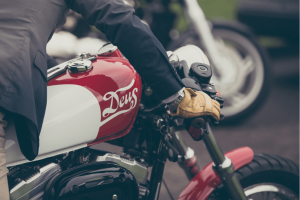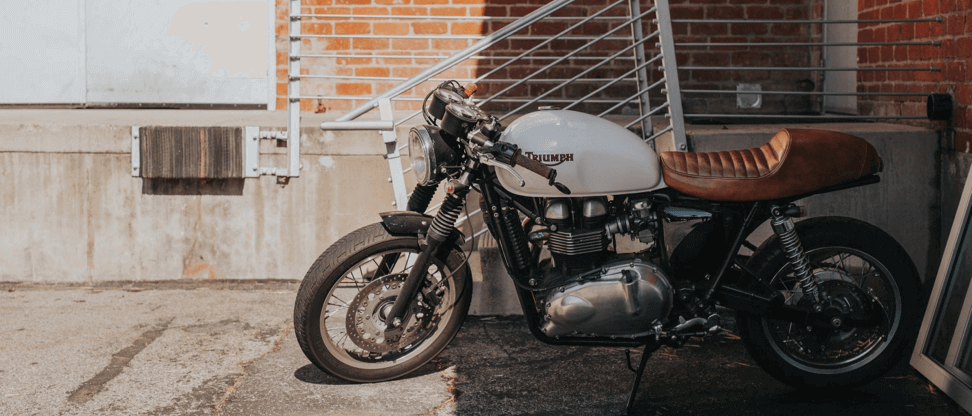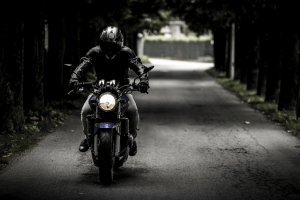5 Motorcycle Safety Tips: How To Stay Safe On A Motorcycle
The weather might not seem like it now, but it’s about to get colder out. Today is actually the first day of fall! And while that means a lot of U.S. residents will be putting their bikes away for the winter, there will still be plenty of riders out there riding day and night until the first flake of snow falls nonchalantly onto the road. Regardless of which camp you find yourself in, it’s never too early or too late to brush up on motorcycle safety—especially considering the unprecedented rise in motorcycle accidents over the course of the last few years. Whether you’re a new or seasoned rider, here are a few quick motorcycle safety tips to help you stay safe on a motorcycle all year round.
DON’T OUTPUNCH YOUR WEIGHT CLASS
If you’re looking for a new ride, it’s best practice to avoid purchasing a bike that’s too big. Bigger motorcycles are designed for taller and larger riders, which is why they’re almost always more powerful. In other words: the extra power compensates for the extra height and weight of the rider. Too many accidents have involved smaller riders on larger bikes. You might be able to handle a bigger bike’s performance on straightaways and tip-toe at a complete stop, but the weight and power of the bike is going to overpower you during turns, eventually causing you to crash.
To reduce the risk of accident and potentially serious injury, choose a bike that’s your size. Make sure your arms can comfortably reach the handle bars and, while sitting upright on the seat, your feet can rest flatfooted on the ground.
DON’T CREATE AN EXTRA LANE
This might strike many people as common sense, but it’s a prevalent and reoccurring problem. Not only is it technically illegal to create an extra lane between two vehicles, it’s incredibly dangerous. Non-motorcyclists have a hard enough time seeing motorcycles as it is and surprising, unpredictable driving tactics aren’t the solution. It’s also a violation of state and federal law to use a turn lane as a passing or merging lane. If you need to get somewhere in a hurry, leave sooner and account for traffic. If nothing else, it’s better to show up late and safe than not at all.
ALWAYS WEAR GLOVES

- Protect your hands and wrists from impact and abrasions during a fall or crash
- Prevent hand numbness and blisters while riding
- Keep your hands warm
- Improve overall bike control and handling
- Improve your grip on the throttle, clutch, and brake
No matter your preference, when looking for gloves, it’s ideal to find a pair that features both a non-slip grip and a retention strap. These will keep your gloves secure on your hands and wrists, protecting them throughout the duration of a crash.
STAY HYDRATED
Regardless of your experience, riding a motorcycle is a mentally taxing and physically exhausting undertaking. Unlike those behind the wheel of a car, motorcyclists don’t have the dangerous luxury of distracted driving. Instead, motorcyclists are left to, at all times, focus on the task of driving (e.g. balancing, steering, reacting, , etc.) while battling weather conditions such as wind, heat, rain, and more. As such, it’s important to combat the elements and stay hydrated in order to avoid drowsiness, dizziness, and muscle cramps, all of which can seriously affect your balance and result in an accident.
To stay safe on a motorcycle, it’s recommended to drink water throughout the day—not just when you’re thirsty. Proper hydration will keep your mind focused and your joints lubricated over the duration of your ride. Under no circumstances should you operate a vehicle, motorcycle, or bicycle while impaired. If you’re feeling light headed, you should pull over immediately and take a break.
WHEN IN DOUBT, “NO”
The final motorcycle safety tip might just be the most important. But what does it mean exactly? For one it’s a useful reminder that, when on a bike, you should never leave your comfort zone unless you absolutely have to. If you doubt you can do something or perform a particular maneuver for even a second, then you shouldn’t. Staying in your comfort zone will allow you to relax—and when you’re relaxed, you’re less tense. When you’re less tense, you’re a better rider.
It’s also a useful reminder to trust yourself and your limits. For example, if you doubt a driver sees you, then trust your instincts and adjust accordingly within the realm of your capability. On the road, second guessing yourself could be the difference between avoiding an accident and ending up on the pavement. That’s why, if you’re in doubt: “No.” If you’re forced into an uncomfortable situation, trust your training and experience to pull you through. Don’t panic – stay calm, stay collected, stay safe.
One reason riding a motorcycle is incredibly fun is because it’s incredibly dangerous. But that doesn’t mean protecting yourself is going to hinder your enjoyment or negate danger and damages entirely. In fact, because your mood affects your decision making, it’s important to have fun – so long as it’s safe. It isn’t just you out there, and knowing how to stay safe on a motorcycle will help you and other drivers safe on the road. As such, it’s important to stay informed on as many motorcycle safety tips as possible—new and old—before, during, and after motorcycle season.
motorcycle accident attorney
 As a Portland motorcycle accident attorney, my sole focus is to represent victims and their families who have been wrongfully injured because of another’s careless or intentional conduct. I hope this website is a place to learn more about our law firm, as well as, an educational resource for Oregonians who have been victims of motorcycle crashes. It is not intended to be legal advice, as every case is unique and should be accurately evaluated.
As a Portland motorcycle accident attorney, my sole focus is to represent victims and their families who have been wrongfully injured because of another’s careless or intentional conduct. I hope this website is a place to learn more about our law firm, as well as, an educational resource for Oregonians who have been victims of motorcycle crashes. It is not intended to be legal advice, as every case is unique and should be accurately evaluated.
If you or someone you know has been injured because of another person’s conduct, and you are looking for a skilled attorney to lead you through the insurance roadblocks, please call today for a free and confidential case evaluation. Local (503) 610-0005, Toll-free 1-800-949-1481, or email travis@mayorlaw.com.
additional help
For additional information about personal injury cases, insurance, and maximizing your financial recovery, I recommend the following articles on my Blog:
Travis Mayor Named Rising Star by Oregon Super Lawyers
8 Mistakes Insurance Companies Are Hoping You Make!
Oregon Car Insurance and Personal Injury Claims FAQs


